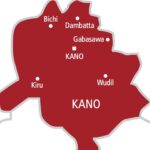Kano businessmen and women who deal in ice block are lamenting the drastic fall in their revenue owing to the recent cash crunch in the country, inconsistent weather as well as improved electricity supply in the state and neighbouring ones, Daily Trust Saturday reports.
Ice block business is known to be among top booming businesses during the month of Ramadan, thereby boosting the income of hundreds of people who wait patiently for the period. Apart from them, hundreds of people who join the business on a temporary basis also make significant income during the period.
The boom and rush for ice blocks are mostly because of the need to cool off the 14 to 15 hours-long thirst for water occasioned by fasting amidst scorching sun which makes the weather hotter and hence a higher level of dehydration.
Every year, many people, directly or indirectly, generate huge amounts of money from ice block business. While some are the owners of the coolers in various cold rooms, others are labourers, who work for them to earn a living.
Ramadan: Commission receives cows, cash for insurgency victims
Ramadan: Cashless policy, weather cripple ice block business in Kano
With the majority of their customers coming from neighbouring states and Kano villages, the sellers said they also attract customers from as far as Niger Republic and that they purchase the ice block on a daily basis during Ramadan. Other categories of buyers, especially women, sell ice blocks in metropolitan areas to households in Kano.
Majority of the markets known for selling ice blocks include Kanzu ice block market in Katsina Road; Gidan Zobo ice block market in Dawakin Dakata; Dakata ice block market and Sharada ice block market all in Kano metropolis.

However, Daily Trust Saturday gathered that this season has come with changes that not only affect the purchase of ice block but also crashed the business by nearly 70 per cent. These, among others, threaten the chances of many people recovering their capital after investing millions, waiting for the period to recover and even make profits.
Change of weather and CBN’s cashless policy affecting price
In an interaction with major dealers and sellers of ice block in their markets in Kano, they lamented over the decline in the price of ice block since the commencement of Ramadan which they attributed mostly to the cashless policy of the Central Bank of Nigeria (CBN) as well as the inconsistency in the season’s weather. This decline in price, they said, is however coming amidst the high cost of electricity, water and other things needed for the business to thrive.
Speaking to Daily Trust Saturday, a major dealer in Dakata, Muhammadu Arabi Salisu, who has 13 coolers, said the unpredictable weather this season has contributed to the crash in the price of ice block, as there was no consistent hot weather this time around.
“If you look at the weather, it keeps changing from hot to cold and sometimes in between—neither hot nor cold. This is not good weather for the ice block market because it reduces the number of buyers. By this time last week, it was very hot, and we made significant sales. People were trooping in to buy and the price was between N150 and N200,” he said.
He also stated that the recent cashless policy which brought about the unavailability of cash also contributed to the challenges they were facing.
“People are saying that they don’t have physical cash. You know the policy has plunged people into hardship, so they are not after buying ice blocks. They are looking for food to eat. Ice block is purchased when you have enough money to buy food, then you will talk about it.
“Majority of our customers come from the villages and they were the most affected by the cashless policy, so they are not coming,” he added.
Also speaking to Daily Trust Saturday, another dealer in Dakata area of Nasarawa LGA, Sani Muhammad, who said he has spent over two decades in the business, lamented over what he described as a nearly total collapse of the business. He said this year, they can hardly talk about profit in the business, adding that some have even started closing their coolers.
“We just thank God that we are alive this Ramadan, because as far as our market is concerned, we are going down. Despite the fact that the prices of everything we use, like nylon, water, diesel and electricity all increased, even by 100 per cent, our price is declining. Right now, we sell the big ice blocks at the rate of N30, N25, and even N20. This is what is happening this season.”
He said last year, they were selling for N150 and even as high as N200, but this season, they have not hit N50 per one.
A woman at the popular Gidan Zobo known for selling ice blocks with over 250 coolers, Hajiya Jamila Umar, said if the problem persists, she will close her coolers, as it is better for her to stay at home than come and lose her capital.
“We spend nearly N15,000 to cater for what will produce one cooler including the people that work for us. And remember it takes three days for a cooler to become a full ice block. Every week, we pay N8,000 for electricity. But when we sell, we hardly get N12,000, this is not business.”
According to another seller in Sharada, Shamsudden Jaafar (Shola), a cooler of ice block normally carries 500 to 700 blocks depending on the size, and the average price is N150, especially last year. Cumulatively, a cooler of 500 ice blocks will generate N75,000, unlike this year where it is generating only N15, 000. The capital usually ranges from N12,000 to N150,000 without the money for the purchase of cooler and electricity.
“The only people enjoying the business this year are those selling to households or coming from villages. Some of them sell between N100 and N200, with some, even selling N250. But they also pay for transport which is also expensive nowadays. Also due to the weather, they sometimes lose,” he said.
Improved electricity in neighbouring states, Niger Republic also responsible
Improved supply of electricity in the country is regarded as a significant development, but for ice block sellers, the reverse is the case as it has barred people from coming to patronize them.
The improved supply in Katsina, Jigawa and some parts of Kano State, as well as in neighbouring communities in Niger Republic has affected their sales, thereby reducing the patronage from the neighbouring states and Niger, the ice block sellers lamented.
“We used to have customers from Katsina, Jigawa and Niger Republic. But this year, all of them didn’t come to buy ice blocks. They have enough electricity to use and get cold water and ice blocks for household use and even for sale.
“I have a customer from the Niger Republic who told me that for a whole month now, they have had light. Likewise, in Katsina, one of my customers told me that they now have 24-hour power supply. That is why people are not buying. Even in Kano, some places are getting 24 hours electricity supply, especially those on 33KVA line,” Hajiya Jamila said.
The marketers said they are now targeting the peak of the heat period, even though it will come after Ramadan, hoping that the business will boom again with soft drink and meat sellers patronizing them.

 Join Daily Trust WhatsApp Community For Quick Access To News and Happenings Around You.
Join Daily Trust WhatsApp Community For Quick Access To News and Happenings Around You.


